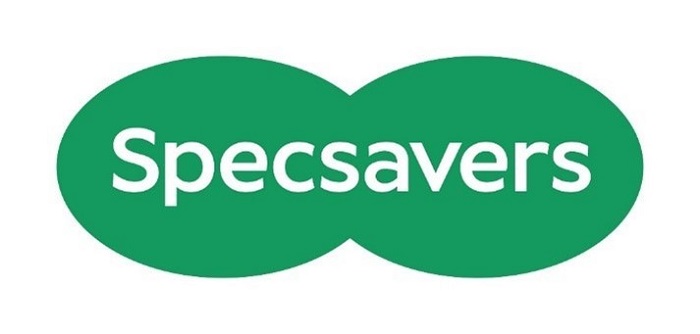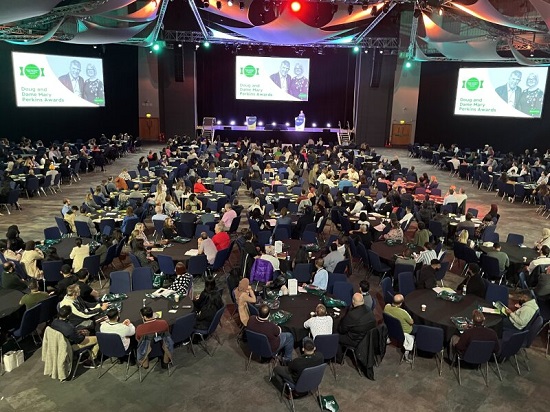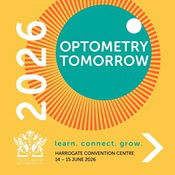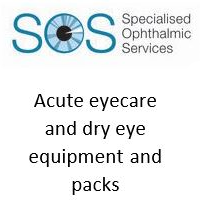Education
Specsavers PAC Stories from 2023 Conference
Specsavers PAC Stories from 2023 Conference

Access to sight care for those experiencing homelessness highlighted at conference
IMPROVING access to sight care for those experiencing homelessness has featured at this year’s Professional Advancement Conference organised by Specsavers.
The discussion workshop was led by Yorkshire optometrist Ross Campbell, who volunteers at an eye clinic for people experiencing homelessness, at the conference held at the Birmingham International Convention Centre on 17 September. The overall event – open to everyone in the optics and audiology sectors – saw thousands of people attend.

‘The session on homelessness covered the scale of the issue and the impact it has on access to care. It isn’t just about rough sleeping – it’s also about people removed from their home through no fault of their own,’ says Mr Campbell.
Underlining the challenges, he highlighted a study that showed 82% of people experiencing homelessness were dispensed glasses at Christmas clinics run by Vision Care for Homeless People (VCHP) – a charity that Specsavers partners with.
‘In this research 32% needed to be referred for an eye condition or had a condition that required management, while 10% of them needed to be referred to secondary care for treatment. This is a lot higher than in the general population,’ he says.
Mr Campbell, optometry partner at Specsavers Swaledale and Northallerton, also says that people experiencing homelessness often cannot access benefits that entitle them to free NHS funded sight tests and glasses.
‘When you don’t have a secure roof over your head, you’re not necessarily going to be thinking about when is my next eye test due? They may also feel uncomfortable going into high street practices,’ he adds.
Mr Campbell also spoke about his voluntary work at VCHP’s Leeds clinic during the workshop. ‘I’ve been fortunate enough to speak to many people affected by homelessness. There was one case of someone in employment but on a zero hours’ contract. As a result, they were sofa surfing and couldn’t afford the new glasses they needed.
‘They were applying for another job with more steady, stable hours, which involved a computer-based assessment. But they couldn’t see that well. The simple fact of being able to supply them with a pair of glasses helped give them the best chance of getting out of that situation.’
Urging others to consider volunteering, he says: ‘People get into optometry because they want to make a difference because they feel like the work that they do has purpose.
‘If you have the time and ability to volunteer, it’s massively rewarding because these are some of the most vulnerable people in our society, who are overlooked and underserved. We have the privilege of having the opportunity to help change their lives.’
The conference also saw glaucoma experts Professor Anthony King and Professor Roshini Sanders addressing delegates about the challenges and prospects for glaucoma care. It was announced that Specsavers has renewed its partnership with charity Glaucoma UK, which is chaired by Professor King.
‘Specsavers is proud to organise this important event, which shares critical knowledge and learning for the benefit of patients and clinicians,’ says Grant Duncan, Specsavers director of professional development. ‘It was inspiring to hear our expert presenters, with delegates taking away valuable CPD points as well.’
Clinical excellence and customer service recognised by Specsavers founders
Specsavers founders Doug and Dame Mary Perkins recognised the outstanding work of Specsavers colleagues from across the UK and Northern Ireland and the Republic of Ireland at the conference.
The Doug Perkins medal recognised clinical excellence by optometrists. They were Beth March-Jones for her work with Specsavers Sale in England, Sabina Arshad of Specsavers Llanishen in Wales, Elaine Hawthorn of Specsavers Stranrarer in Scotland, and Helen Rocks of Specsavers Banbridge in Northern Ireland.
The medal was also given to Fiona O’Donnell of Specsavers Drogheda in the Republic of Ireland. The domiciliary clinical excellence award was given to Paula Conway of the York Home Visits service.
Dame Mary Perkins medals for outstanding clinical customer care were awarded to the team at Specsavers Ludlow in England, the Specsavers Caernarfon team in Wales, Diana Kelly at Specsavers Linlithgow in Scotland and the team at Specsavers Antrim in Northern Ireland. From the Republic of Ireland, the Specsavers Tullamore team received the award. The domiciliary category was won by Claire Unsworth from the Manchester Home Visits service.
For audiology, the Doug Perkins medal was awarded to Brian Maher of Specsavers Clonmel in the Republic of Ireland while the Dame Mary Perkins medal was given to Kate Kulesza of Specsavers Aberdeen in Scotland.























